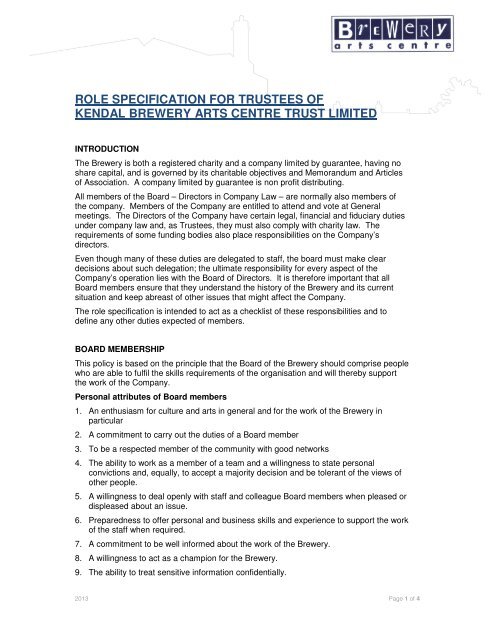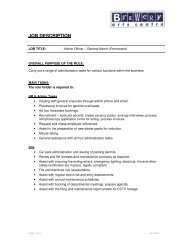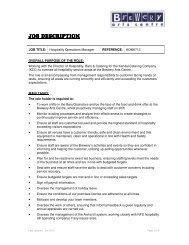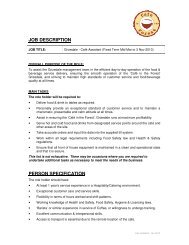Trustee Role Specification - Brewery Arts Centre
Trustee Role Specification - Brewery Arts Centre
Trustee Role Specification - Brewery Arts Centre
Create successful ePaper yourself
Turn your PDF publications into a flip-book with our unique Google optimized e-Paper software.
ROLE SPECIFICATION FOR TRUSTEES OF<br />
KENDAL BREWERY ARTS CENTRE TRUST LIMITED<br />
INTRODUCTION<br />
The <strong>Brewery</strong> is both a registered charity and a company limited by guarantee, having no<br />
share capital, and is governed by its charitable objectives and Memorandum and Articles<br />
of Association. A company limited by guarantee is non profit distributing.<br />
All members of the Board – Directors in Company Law – are normally also members of<br />
the company. Members of the Company are entitled to attend and vote at General<br />
meetings. The Directors of the Company have certain legal, financial and fiduciary duties<br />
under company law and, as <strong>Trustee</strong>s, they must also comply with charity law. The<br />
requirements of some funding bodies also place responsibilities on the Company’s<br />
directors.<br />
Even though many of these duties are delegated to staff, the board must make clear<br />
decisions about such delegation; the ultimate responsibility for every aspect of the<br />
Company’s operation lies with the Board of Directors. It is therefore important that all<br />
Board members ensure that they understand the history of the <strong>Brewery</strong> and its current<br />
situation and keep abreast of other issues that might affect the Company.<br />
The role specification is intended to act as a checklist of these responsibilities and to<br />
define any other duties expected of members.<br />
BOARD MEMBERSHIP<br />
This policy is based on the principle that the Board of the <strong>Brewery</strong> should comprise people<br />
who are able to fulfil the skills requirements of the organisation and will thereby support<br />
the work of the Company.<br />
Personal attributes of Board members<br />
1. An enthusiasm for culture and arts in general and for the work of the <strong>Brewery</strong> in<br />
particular<br />
2. A commitment to carry out the duties of a Board member<br />
3. To be a respected member of the community with good networks<br />
4. The ability to work as a member of a team and a willingness to state personal<br />
convictions and, equally, to accept a majority decision and be tolerant of the views of<br />
other people.<br />
5. A willingness to deal openly with staff and colleague Board members when pleased or<br />
displeased about an issue.<br />
6. Preparedness to offer personal and business skills and experience to support the work<br />
of the staff when required.<br />
7. A commitment to be well informed about the work of the <strong>Brewery</strong>.<br />
8. A willingness to act as a champion for the <strong>Brewery</strong>.<br />
9. The ability to treat sensitive information confidentially.<br />
2013 Page 1 of 4
Other guidelines<br />
1. Skills requirement<br />
Currently the <strong>Brewery</strong> acknowledges the need for the following areas of expertise:<br />
artistic, management, personnel, press and public relations, marketing, planning,<br />
building development, legal, finance, investment and bar/catering. Good business<br />
networks are also valued.<br />
2. Sources<br />
Board members will generally be drawn from within the catchment area of The <strong>Arts</strong><br />
<strong>Centre</strong> but other geographical areas will be considered when particular skills are<br />
required. The Board will carry out a regular audit of its skills and consider what<br />
networks can be accessed to recruit missing skills. When vacancies occur public<br />
advertisement will generally be used.<br />
3. Commitment<br />
This role specification for board members outlines expected attendance on behalf of<br />
the <strong>Brewery</strong>. Any member who fails to attend on more than 50% of the available<br />
opportunities in a year may be asked by the chair to resign.<br />
4. Term of office<br />
Generally a maximum of three terms of three years, but the board may vote to extend<br />
this if the <strong>Brewery</strong> would particularly benefit as a result or if retirement by rotation at<br />
AGMs leads to a trustee serving a term of significantly less than three years duration.<br />
Initially there will have to be some phasing to ensure that all members do not retire at<br />
the same time.<br />
NB Section 72(1) of the Charities Act 1993 disqualifies anyone from being a <strong>Trustee</strong> who:<br />
• has been convicted of an offence involving deception or dishonesty, unless the<br />
conviction is spent<br />
• is an undischarged bankrupt<br />
• has previously been removed from trusteeship of a charity by the court or the Charity<br />
Commissioners<br />
• is under a disqualification order under the Company Directors Disqualification Act<br />
1986<br />
It is an offence to act as a charity trustee while disqualified unless the Charity Commission<br />
has given a waiver under section 72(4) of the Charities Act 1993.<br />
Attendance<br />
1. At quarterly Board meetings or any “emergency” meetings and also at all General<br />
meetings, which will normally coincide with Board meetings.<br />
2. At committee or working party meetings, if a member.<br />
3. At performances, exhibitions, public events, fund raising events, etc. as<br />
appropriate.<br />
4. To provide advice and support to the senior staff, either by telephone or in person,<br />
if required.<br />
2013 Page 2 of 4
DUTIES AND RESPONSIBILITIES<br />
Legal and Financial Duties<br />
1. To ensure that the Company operates in accordance with Company and Charity Law.<br />
This includes the filing of statutory returns at Companies House, returns to the Charity<br />
Commission and the keeping of Company Registers.<br />
2. To ensure the prudent financial management of the Company. To exercise financial<br />
control; to scrutinise quarterly statements of the financial position; to discuss and<br />
decide on annual budgets and to review and, if required, approve revised budgets. To<br />
decide on and, if necessary, assist with applications to funding bodies.<br />
3. To ensure the Company keeps proper accounts and that audited accounts are<br />
produced annually and submitted to Companies house, the Charity Commission and<br />
funding bodies.<br />
4. To ensure the payment of all taxes due to the Inland Revenue and HM Customs and<br />
Excise.<br />
5. To appoint bankers and cheque signatories and to make clear decisions about staff<br />
spending powers.<br />
6. To ensure that the Company’s assets are safeguarded and are well managed and<br />
maintained.<br />
7. To ensure that the Company is properly insured.<br />
NB. Directors should note that if the Company is not run within the limits of its financial<br />
resources it is possible that they could be held personally liable for the company’s debts<br />
and disqualified from being a Company Director, if they are not seen to have acted<br />
prudently. It is therefore essential that Directors are kept informed of the company’s<br />
financial position so that they can monitor the Company’s ongoing financial situation.<br />
Employment and Personnel Duties<br />
(Directors should note that the Board of Directors is the employer of KBACTL staff. The<br />
Board of KCCL employ KCCL Staff).<br />
1. To appoint the Chief Executive.<br />
2. To define the Company’s employment policies, including equal opportunities,<br />
recruitment, pay, grievance and disciplinary, appraisal, sickness, expenses, holidays<br />
and training.<br />
3. To approve the staffing structure and to take part in the recruitment of senior<br />
personnel and other recruitment if required.<br />
4. To agree the job descriptions, person specifications and terms of employment of<br />
Board appointments and the outline terms and conditions for other staff and to review<br />
levels of pay annually.<br />
5. The Chair of the Board, or an appointed deputy, should act as the Chief Executive’s<br />
line manager in terms of support and appraisal and grievance and disciplinary<br />
procedures.<br />
6. To ensure the sage and efficient use of premises for both staff and the public.<br />
2013 Page 3 of 4
Policy and Planning<br />
1. The Board defines Company policies, sets policy priorities and determines<br />
strategies for the implementation of the policies. In particular, the Board should<br />
discuss and decide on the Company’s 3 year business plan. All Directors should<br />
be familiar with and a have a good understanding of all Company policy<br />
documents.<br />
2. The Board should monitor all aspects of service delivery and policy implementation<br />
on a regular basis.<br />
3. The Board should regularly review all areas of policy and policy implementation<br />
documents and make appropriate revisions. (This includes a review of this<br />
document).<br />
Artistic<br />
1. To stimulate, agree and review the <strong>Brewery</strong>’s overall artistic policy.<br />
2. To monitor artistic activities and ensure that policy and financial guidelines are<br />
being met.<br />
Advocacy<br />
1. To promote the <strong>Brewery</strong>, its activities and its needs to the private, public and<br />
voluntary sectors so as to enhance the Company’s profile and assist with<br />
fundraising for the Company.<br />
2. To act as a listening post in order to provide any information which might be of<br />
assistance to the Company.<br />
3. To act as an enthusiastic ambassador for the Company at all times.<br />
Management<br />
1. To establish a cycle of meetings with appropriate papers to service the Board<br />
efficiently.<br />
2. To establish a committee structure as required by the Articles of Association, to<br />
agree representation on these committees and appropriate Terms of Reference,<br />
and to receive reports from the committees at Board meetings.<br />
3. To establish a system of communications and delegated decision making so that<br />
urgent decisions can be made and acted upon between Board meetings.<br />
4. To establish fixed term working parties on specific issues is required.<br />
5. To appoint additional Directors with specialist knowledge and skills as required.<br />
2013 Page 4 of 4







